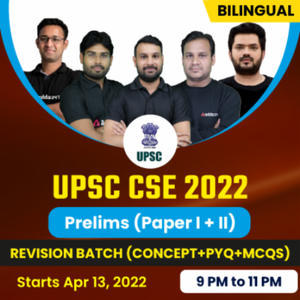Table of Contents
स्वच्छ ऊर्जा मंत्रिस्तरीय (CEM) – यूपीएससी परीक्षा के लिए प्राथमिकता
- GS पेपर 2: अंतर्राष्ट्रीय संबंध- द्विपक्षीय, क्षेत्रीय एवं वैश्विक समूह तथा भारत से जुड़े एवं/या भारत के हितों को प्रभावित करने वाले समझौते।

समाचारों में स्वच्छ ऊर्जा मंत्रिस्तरीय (क्लीन एनर्जी मिनिस्टीरियल/सीईएम)
- भारत स्वच्छ ऊर्जा मंत्रिस्तरीय (सीईएम) वरिष्ठ आधिकारिक बैठकों की मेजबानी कर रहा है, जो 08 को समाप्त होगी
- स्वच्छ ऊर्जा नीतियों में विभिन्न कार्य की शाखाओं के कार्यों की समीक्षा के लिए स्वच्छ ऊर्जा मंत्रिस्तरीय (सीईएम) बैठक आयोजित की जा रही है।
- स्वच्छ ऊर्जा मंत्रिस्तरीय (सीईएम) बैठक का उपयोग सितंबर 2022 में आगामी स्वच्छ ऊर्जा मंत्रिस्तरीय बैठक के लिए एजेंडा तैयार करने के लिए भी किया जाएगा।
स्वच्छ ऊर्जा मंत्रिस्तरीय (सीईएम) के बारे में मुख्य तथ्य
- स्वच्छ ऊर्जा मंत्रिस्तरीय (सीईएम) के बारे में: स्वच्छ ऊर्जा मंत्रिस्तरीय (सीईएम) नीतियों एवं कार्यक्रमों को प्रोत्साहन देने हेतु एक उच्च स्तरीय वैश्विक मंच है जो वैश्विक स्वच्छ ऊर्जा भविष्य में संक्रमण पर ध्यान देने के साथ ज्ञान एवं सर्वोत्तम पद्धतियों को साझा करके स्वच्छ ऊर्जा प्रौद्योगिकी को आगे बढ़ाता है।
- स्वच्छ ऊर्जा मंत्रिस्तरीय (सीईएम) सचिवालय पेरिस, फ्रांस में अंतर्राष्ट्रीय ऊर्जा एजेंसी (आईईए) के अंतर्गत स्थित एक छोटी, लोचशील टीम है।
- स्वच्छ ऊर्जा मंत्रिस्तरीय ढांचा: यह सीईएम शासन संरचना को परिभाषित करता है तथा मिशन वक्तव्य, उद्देश्यों, सदस्यता एवं मार्गदर्शक सिद्धांतों की रूपरेखा तैयार करता है।
- CEM का मिशन: CEM एक मिशन: एक्सलरेट क्लीन एनर्जी ट्रांजिसंस को प्राप्त करने के लिए विश्व के सर्वाधिक वृहद एवं अग्रणी देशों, कंपनियों तथा अंतरराष्ट्रीय विशेषज्ञों के एक शक्तिशाली समुदाय को एक साथ लाता है।
- सदस्यता: स्वच्छ ऊर्जा मंत्रिस्तरीय (सीईएम) 29 सदस्य देशों का एक उच्च स्तरीय वैश्विक मंच है।
- भागीदारी: यह विश्व के अग्रणी अर्थव्यवस्थाओं, अंतरराष्ट्रीय संगठनों एवं कंपनियों को एक ही मिशन अर्थात एक्सलरेट क्लीन एनर्जी ट्रांजिसंस को प्राप्त करने के लिए एक साथ लाता है।
स्वच्छ ऊर्जा मंत्रिस्तरीय (CEM)
CEM एक अंतरराष्ट्रीय स्वच्छ ऊर्जा नेतृत्व मंच, एक संयोजक मंच, एक कार्य मंच तथा एक त्वरण मंच है। यह इस प्रकार कार्य करता है:
- एक ऐसा मंच जहां इसके सदस्य वैश्विक स्वच्छ ऊर्जा एजेंडा को आकार देने में सहायता करते हैं एवं विशिष्ट स्वच्छ ऊर्जा प्रौद्योगिकियों तथा समाधानों के परिनियोजन को आगे बढ़ाते हैं।
- ज्ञान एवं अंतर्दृष्टि के आदान-प्रदान, नेटवर्क तथा साझेदारी के निर्माण एवं स्वच्छ ऊर्जा पर समन्वित कार्यों को सुविधाजनक बनाने हेतु एक ऊर्ध्वगामी (बॉटम-अप), सरकार के नेतृत्व वाला समुदाय।
- एक कार्यान्वयन वाहन जो अपने सदस्यों को विशिष्ट घरेलू स्वच्छ ऊर्जा उद्देश्यों को प्राप्त करने में सहायता करता है।




 TSPSC Group 1 Question Paper 2024, Downl...
TSPSC Group 1 Question Paper 2024, Downl...
 TSPSC Group 1 Answer key 2024 Out, Downl...
TSPSC Group 1 Answer key 2024 Out, Downl...
 UPSC Prelims 2024 Question Paper, Downlo...
UPSC Prelims 2024 Question Paper, Downlo...





